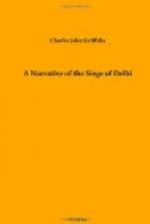The 1st of August was the anniversary of a great Mohammedan festival called the “Bakra Id,” and for some time there had been rumours of a grand sortie in honour of the event.
Morning and afternoon passed, and we began to think the enemy had given up their purpose, when about sunset firing began at the right pickets. The mutineers returning from our rear had met an equal number, which had sallied from the city, at the suburb of Kishenganj, and the forces, joining together, moved forward and attacked the whole right of the ridge and the pickets in that quarter.
Loudly the bugles sounded the alarm all over the camp, and in a very short time every available man was mustered, and the troops were hurried forward to reinforce the breastworks at Hindoo Rao’s house and on each side.
There had been only one actual night-attack since the beginning of the siege, and that took place to the rear; it therefore naturally occurred to the officers in command that this assault by the enemy with such vast numbers would require all our efforts to prevent being turned, thus imperilling the safety of the camp.
The action had commenced in earnest when we arrived on the ridge, and the brave defenders of Hindoo Rao’s house were holding their own against enormous odds. Masses of infantry with field-guns swarmed in our front, yelling and shouting like demons while keeping up a steady fire.
Darkness came on—a lovely night, calm and clear without a cloud in the sky. The batteries on both sides kept up a terrific cannonade; and our men, effectually concealed behind the earth-works, poured incessant volleys of musketry into the enemy. The roar and din exceeded anything I had ever heard before, and formed one continuous roll, while all around the air was illumined by a thousand bright flashes of fire, exposing to our view the movements of the rebels. They had also thrown up breastworks at no great distance to our front, from behind which they sallied at intervals, returning, however, quickly under cover when our fire became too hot for them. And in this manner, without a moment’s intermission, the combat continued all night long, with no advantage to the assailants, and with few casualties on our side.[4]
August 2.—Morning broke without any cessation in the firing; and it was not till ten o’clock that the rebels, seeing how futile were all efforts, began to retire. Some few still kept up the firing; but at 2 p. m. all was quiet, and our sadly harassed soldiers were enabled to obtain some rest after seventeen hours’ fighting. Nothing could have surpassed the steadiness of the men and the cool manner in which they met the attacks of the enemy, remaining well under cover, and only showing themselves when the rebels came close up. Our casualties during those long hours only amounted to fifty killed and wounded, thus proving the judgment of the General in ordering the men to remain behind the earthworks, and not to advance in pursuit unless absolutely necessary. Two hundred dead bodies were counted in front of the entrenchments, and doubtless during the darkness many more were carried off by the enemy.




